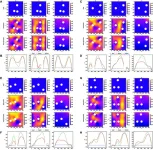(Press-News.org) Despite what we’ve been led to believe, the timing of evening screen use, rather than the activity itself, negatively impacts youth sleep, a University of Otago study has found.
Current sleep guidelines recommend no screen use in the hour or two before bed. However, the researchers found screen time in the two hours before bed had little impact on youth sleep, it was screen time once in bed that caused problems.
Lead author Dr Bradley Brosnan, of the Edgar Diabetes and Obesity Research Centre, says screen time is a mainstay in adolescents’ bedtime routines, and sleep guidelines need to be revaluated to better reflect modern life.
Published in JAMA Pediatrics, the study had 85 adolescents aged 11 to 14 years wear a body camera on their chest from three hours before bed until they got into bed, over the course of one week.
Along with the body camera capturing when, what and how they used their screens, a second infrared camera was placed in their bedrooms to capture their screen time while in bed. They also wore an actigraph, a watch-sized device which measures sleep.
“It quickly became obvious that adolescents spend a lot of their screen time while in bed,” Dr Brosnan says.
The researchers found 99 per cent of participants used screens in the two hours before bed, more than half used screens once in bed, and a third used them after first trying to go to sleep for the night.
“Our most interesting findings were that this screen time before they got into bed had little impact on sleep that night.
“However, screen time once in bed did impair their sleep – it stopped them from going to sleep for about half an hour, and reduced the amount of sleep they got that night.”
This was particularly true for more interactive screen activities like gaming and multitasking – when more than one device is used at the same time, such as watching a movie on Netflix on a laptop while playing Xbox on a gaming device.
“Every additional 10 minutes of this type of screen time reduced the amount of sleep they got that night by almost the same amount.
“Our findings suggest that the impact of screen time on sleep is primarily through time displacement delaying sleep onset rather than any direct effects of blue light or interactive engagement as we didn’t find associations with sleep latency and wakefulness during the sleep period.”
Dr Brosnan says a ‘simple’ sleep guideline – in theory but not necessarily reality – would be for devices to be kept out of the bedroom, allowing teenagers to use their devices before bed, but not in bed.
“We need to revisit sleep guidelines, so they fit the world we live in, and actually make sense – the current ones aren’t achievable or appropriate for how we live.”
END
Keep devices out of bed for better sleep – Otago study
2024-09-03
ELSE PRESS RELEASES FROM THIS DATE:
Dr. Torabi to study vulnerabilities in electric vehicle charging management systems
2024-09-03
Dr. Sadegh Torabi, Assistant Professor, Information Sciences and Technology, College of Engineering and Computing (CEC), and Research Fellow at the Center for Secure Information Systems (CSIS), is set to receive funding for the project: “Collaborative Research: CISE MSI: RPEP: OAC: Macroscopic and Microscopic Inference and Analysis of Vulnerabilities within EV Charging-Management Systems.”
Via this project, Dr. Torabi and his partners will establish a collaborative ecosystem among academia, industry, and the public sector to bolster the resilience of the EV Charging Infrastructure (CI). The critical nature of EV CI has made them targets for malicious attacks, often state-sponsored, ...
Think simpler, flow faster
2024-09-03
Analyzing and simulating fluid flow is a challenging mathematical problem that impacts various scenarios, including video game engines, ocean current modeling and hurricane forecasting. The core of this challenge lies in solving the Navier–Stokes equations, a set of classical equations that describe fluid dynamics. Recently, deep learning has emerged as a powerful tool to accelerate equation solving. Using this technique, a team designed a novel approach that can provide accurate solutions 1,000 times faster than traditional equation solvers. The team’s study was published June 26 in Intelligent ...
Eating fish but not omega-3 supplements during pregnancy associated with lower likelihood of autism diagnosis, NIH-funded study finds
2024-09-03
Eating any amount of fish during pregnancy was associated with about a 20% lower likelihood of autism spectrum disorder (ASD) diagnosis, particularly in females, and a slight reduction in autism-related traits in offspring, according to a new study funded by the Environmental influences on Child Health Outcomes (ECHO) Program at the National Institutes of Health.
However, researchers did not find the same association with supplements containing omega-3 fatty acids.
Fish is an important source of omega-3 fatty acids, an essential nutrient during pregnancy for supporting maternal health and child neurodevelopment. A recent analysis of ECHO Cohort data revealed that about ...
Study: racial and ethnic designation inaccuracies in children’s medical records may impede equity efforts
2024-09-03
ANN ARBOR, Mich. – Leaders at three Michigan hospitals aiming to address equity issues for pediatric patients wanted to start with inspecting data key to identifying potential inequities.
What they learned: much of those data are inaccurate.
A study from the Michigan Child Health Equity Collaborative, or Mi-CHEC, found substantial errors across the three health systems in racial and ethnic designations in their electronic medical records. Accuracy of these designations are important to clinical care improvement ...
Penn study finds taking semaglutide for weight management does not increase risk of depression or suicidal behavior in people without known major psychopathology
2024-09-03
PHILADELPHIA— Taking the weight loss medication semaglutide did not increase the risk of depressive symptoms, suicidal thoughts, or suicidal behavior in persons without known major mental health disorders, according to a new study led by researchers from the Perelman School of Medicine at the University of Pennsylvania published this week in JAMA Internal Medicine. Both the Food and Drug Administration (FDA) and the European Medicines Agency are actively monitoring the psychiatric safety of semaglutide and similar medications after post marketing surveillance reports of depression, suicidal thoughts (ideation), ...
GLP-1 receptor agonist use and risk of suicide death
2024-09-03
About The Study: This cohort study, including mostly patients with type 2 diabetes, does not show an association between use of glucagon-like peptide-1 (GLP-1) receptor agonists and an increased risk of suicide death, self-harm, or incident depression and anxiety-related disorders.
Corresponding Author: To contact the corresponding author, Peter Ueda, MD, PhD, email peter.ueda@ki.se.
To access the embargoed study: Visit our For The Media website at this link https://media.jamanetwork.com/
(doi:10.1001/jamainternmed.2024.4369)
Editor’s ...
Psychiatric safety of semaglutide for weight management in people without known major psychopathology
2024-09-03
About The Study: The results of this post hoc analysis suggest that treatment with semaglutide, 2.4 mg, did not increase the risk of developing symptoms of depression or suicidal ideation/behavior vs placebo and was associated with a small but statistically significant reduction in depressive symptoms (not considered clinically meaningful). People with obesity should be monitored for mental health concerns so they can receive appropriate support and care.
Corresponding Author: To contact the corresponding author, Thomas A. Wadden, PhD, email wadden@pennmedicine.upenn.edu.
To access the embargoed study: Visit our For The Media website at this link https://media.jamanetwork.com/
(doi:10.1001/jamainternmed.2024.4346)
Editor’s ...
One minute to save lives: Teaming up with pediatricians to secure firearms
2024-09-03
Large study included 47,307 well-child visits at 30 clinics in Michigan and Colorado
Almost 50% of clinicians receiving a prompt plus added support delivered a secure firearm storage program during well visits versus just 22% of doctors receiving prompt only
Firearm-related injuries are the leading cause of death for young people in the U.S.
‘We can save lives’ with a brief program to support parents in secure storage
CHICAGO --- If it takes a pediatrician less than one minute per visit to talk to parents about how to securely store their firearms and offer a free cable lock, why do only 2% of doctors report routinely doing so?
Turns out, they ...
No link found between popular diabetes medication and suicide
2024-09-03
There has been concern that common diabetes drugs could increase the risk of suicide and self-harm. In a new study, led by researchers at Karolinska Institutet and published in Jama Internal Medicine, no such risk increase was observed.
Drugs of the type GLP-1 analogues lower blood sugar levels and are used by millions of people worldwide. They are mainly used to treat diabetes, but drugs such as Ozempic have also been shown to be effective against obesity, which has increased their popularity.
At the same time, both American and European drug authorities have warned that there may be risks associated with ...
Thousands of jellyfish clones are multiplying in B.C. lakes
2024-09-03
An invasive, freshwater jellyfish is popping up in B.C. waters in the thousands and future sightings could increase rapidly, according to UBC research.
The peach blossom jellyfish clones have been spotted in 34 places in B.C., its furthest northern range in North America, and a recent paper predicts sightings and the number of locations will increase by the end of the decade as climate change extends this range.
Dr. Florian Lüskow, who completed the research during his postdoctoral fellowship ...




